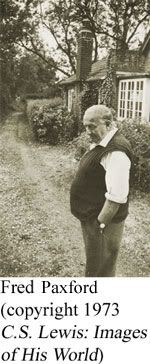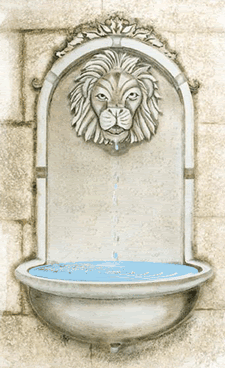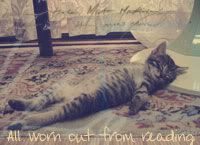He Should Have Been a Parson
 Fred W. Paxford was C.S. Lewis's gardener for more than 30 years at The Kilns. Lewis called him "our indispensable factotum". With his efficient help Lewis and Mrs. Moore planted an orchard on one side of the property, raised rabbits and chickens (for which it was Lewis's longtime task to spade worms), set out flowers, particularly a rose arbor, leveled the lawn in front of the house, and planted a vegetable patch. The character of Puddleglum the Marshwiggle in The Silver Chair is said to have been modeled after Paxford. Here are a few of his reminiscences about Lewis:
Fred W. Paxford was C.S. Lewis's gardener for more than 30 years at The Kilns. Lewis called him "our indispensable factotum". With his efficient help Lewis and Mrs. Moore planted an orchard on one side of the property, raised rabbits and chickens (for which it was Lewis's longtime task to spade worms), set out flowers, particularly a rose arbor, leveled the lawn in front of the house, and planted a vegetable patch. The character of Puddleglum the Marshwiggle in The Silver Chair is said to have been modeled after Paxford. Here are a few of his reminiscences about Lewis:"[Mr. Jack] loved trees and would not have a tree cut down or lopped. When we wanted a few poles to make a bit of rose trellis, we had to get them when he was away for a few days, and cover the cuts with mud so they would not be seen. And when the trees were cut down opposite Magdalen College he was very cross.
It was a pity Mr. Jack could not have lived a few more years until the moon landing. He was very interested in the stars and moon and liked a trip to the observatory. How thrilled Mr. Jack would have been if he could have seen the rock and dust brought back from the moon! He would have been pleased to know that the distance had been so well-estimated by the mathematicians, as he always used to argue that they were accurate, when I used to doubt it. Funny: he used to like to have little arguments; and he never got angry in an argument. One thing we often argued about was coal. He said it was decomposed residue of vegetation, mostly giant frond. Though I am not as religious or good as I ought to be I like to think that the earth and everything it produces was made by God for the good of man: a very old-fashioned outlook now, I suppose. I wonder if by having little arguments with several people he either strengthened his own opinion or made a new one? Or if it was his way of trying to get at the truth?
Mr. Jack should have been a clergyman. He would have made a great parson. When he preached at Quarry Church, it was always packed. He had a full clear voice which could be heard all over the church; and he nearly always brought a bit of humor into the sermons; and people seemed to like this. On a few occasions I had to drive him in to Oxford to preach in St. Mary's. As he always like to be early, I parked the car and went to the service, and the church was always packed.
Of course he was Irish, born in Belfast. But he liked England better than his own country. He liked to go to Ireland for a holiday. I asked him several times when he came back if he wouldn't like to go back to Ireland to live, and he always said no. He must have been one of the few people who liked English weather. He always said it was much better than having several months of hot sunshine and the rest of the year rain every day. And he said our weather was often used as a way to start conversation which would otherwise not have started."
~Fred Paxford, We Remember C.S. Lewis, "He Should Have Been a Parson" (2001)
_____________________
On this day:
1917 Lewis (age eighteen) returns to Great Bookham, Surrey, and William T. Kirkpatrick ("The Great Knock") to prepare for Responsions, the entrance examination for Oxford University.




2 Comment(s):
"I wonder if by having little arguments with several people he either strengthened his own opinion or made a new one? Or if it was his way of trying to get at the truth?"I think this is a brilliant insight. This is the way arguments should be conducted.
Right! And wasn't that partially the purpose of the Inklings, as well? They could bounce their ideas off each other and argue all night, yet they were still friends afterwards.
I liked Paxford's comment about how they had to sneak around and cut branches from the trees when Lewis wasn't home, then hide the cuts with mud! He was just as much a tree lover as Tolkien, wasn't he?
Post a Comment
<< Home